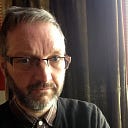How To Be Good Ancestors
On how our descendants are willing us to repent and do the right thing.
Good morning. Although we’re now in late-stage lockdown, our restricted lives have introduced some new habits that will endure.
In our house we started getting milk, in bottles, on the doorstep — taking me back to when I was a kid and the blue tits pecked open the foil tops. Now, our foes are marauding urban foxes.
The bottles come and go, mysteriously, in the small hours, a discreet vision of an alternative invisible economy. A non-disposable world.
This week a report found that since the 5p levy was introduced on single use plastic bags in 2015, their use has dropped by 95%. An unheralded revolution.
Meanwhile a well-known furniture chain says it will buy back our wardrobes … assuming we can work out how to take them apart again.
They want to move to a circular model of consumption — with products reused, not dumped.
Is it possible that the once-fringe mantra of reuse, reduce and recycle is going mainstream?
That having noticed we’re unable to replace the planet, we’re going to have to repair it?
As the election results continue to arrive, there is another vote underway — how every day we get to cast a vote for the world we believe in, through the places where we shop or the companies we do business with.
This is an election for the kind of world we want our children to live in.
As the philosopher Roman Krznarik put it in his recent book, it’s about whether we want to be good ancestors.
It’s about thinking long-term in a world focussed on the short-term.
Many of history’s great wonders — from pyramids to cathedrals — were made by people who knew that it would not be them — but their descendants — who would enjoy the fruits of their labour.
They wanted to leave the world on a path to a better place than they’d found it.
This is sometimes called ‘cathedral thinking’ and it demands an imaginative leap about our place in history… and a great turn in our practice, for governments, companies and individuals.
One of the heaviest words in the religious lexicon — usually caught up with images of judgement and guilt and annoying preachers — is the word ‘repentance’.
But repentance is best understood as a serious change of course — an about turn of 180 degrees.
Maybe not overnight but through the steady adoption of new habits which, over time — even a long time — make incremental change visible.
‘A day is as to the Lord a thousand years,’ says the Bible, poetically.
Or to put it another way, our descendants are willing us to repent and do the right thing.
Perhaps the return of the milk float and the demise of the disposable plastic bag is a signal that we’re in the very early stages of one of the great turns in human history.
If we’re going to be good ancestors there is nowhere else to turn.
(The text of ‘Thought For The Day’ delivered on BBC Radio 4 on May 8th)
— — — —
Previously on Thought For The Day: On ‘missing home’ and the ‘bright sadness’ of lockdown life.
And even more previously, on greeting our nearest neighbours, ‘I Can’t Speak For The Tree.’
